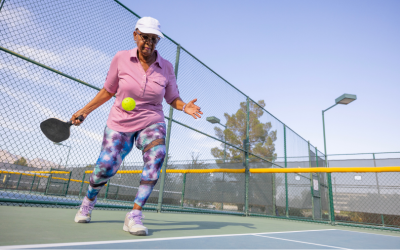How to Treat the Most Common Pickleball Injury
As pickleball continues to rise in popularity among older Americans, many are reaping the health benefits. Frequently hitting the courts is often associated with a boost in heart health, maintaining a healthy body weight, keeping joints flexible and healthy, and improving balance to reduce falls. However, as with any sport, there is also a heightened risk of muscle strains, sprains, and tears over time—especially among those over 60. Amos Song, MD, with Overlake Clinics Musculoskeletal Medicine, shares his recommendations for preventing, identifying and treating the most common pickleball injury.
What is the most common pickleball injury?
Regular players may experience pain in their wrists, ankles, knees or hips, but the most common injury is to the rotator cuff tendon in the shoulder. For many people, rotator cuff damage appears over time with repetitive use. In pickleball, reaching overhead requires a lot of force from this tendon, which can worsen rotator cuff injuries.

What are the symptoms of rotator cuff tendonitis?
Some of the symptoms you might get with rotator cuff tendonitis include:
- Pain in your shoulder.
- Sudden or increased pain with activity.
- Decreased ability to move your shoulder.
- Pain at night.
To diagnose your problem, your provider will look for areas of tenderness and check your shoulder movement and strength.
How can you treat rotator cuff tendonitis?
The first step in treating tendonitis is RICE: rest, ice, compression and elevation. Try to avoid using your shoulder. Apply an ice pack for 15 to 20 minutes several times a day, for the first couple of days, to help relieve pain and swelling. Wrap your shoulder with an elastic bandage to help reduce swelling. And keep your arm and shoulder propped up while applying ice.
What if my shoulder pain persists?
Call your healthcare provider if:
- Your pain gets worse.
- It gets harder to move your injured arm.
- Your pain disrupts your sleep.
- Your pain and discomfort keep you from doing your normal activities.
- You have numbness or tingling in your arms or hands.
Treatment will depend on your symptoms, age and general health. It will also depend on how severe the condition is. For pain that persists, your provider may refer you to a physiatrist—a doctor who specializes in physical medicine and cares for patients with acute and chronic pain, and musculoskeletal problems like tendonitis.
Don’t let persistent pain stop you from doing the activities you love. Overlake’s Sports Medicine and Spine program can help you recover, regain movement, reduce pain and get back to living an active lifestyle.
More information
- The American Academy of Orthopaedic Surgeons has more on rotator cuff injury.
- The U.S. Centers for Disease Control and Prevention has more on how older adults can add physical activity.









